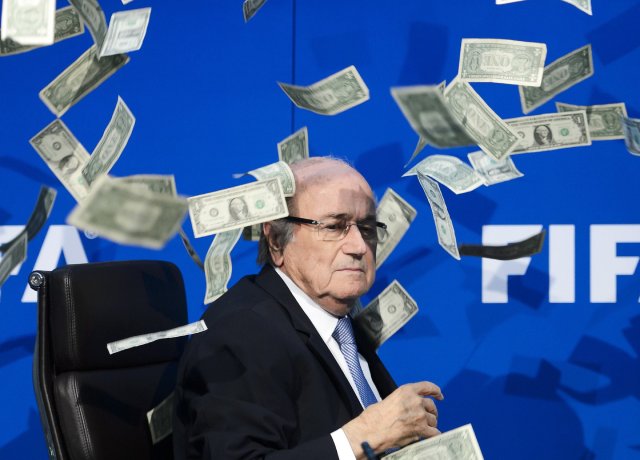The Persian version of this article has printed in “Etemad” Daily, Dated: Thursday, May 31, 2015.
“Blatters” Are Not Few
Vahid Namazi, Journalist and Football Researcher
1.”They cut off my leg. I was destroyed, but one day I will enter that building, kick open Blatter’s door, and seek the truth.” These are the words of Diego Maradona, spoken after the infamous doping scandal at the 1994 World Cup. just after drunken roars of triumph in his last years of playing. When his memoir, I Am Diego, was published, these sentences could be found at the end of the chapter on the American World Cup. He held FIFA responsible, specifically targeting Sepp Blatter, who was then the right-hand man of João Havelange and the de facto executive power at FIFA. We won’t delve into whether Diego’s claims were right or wrong. But what is clear is that occupying the highest executive positions in a massive organization like FIFA for two or three decades has paved the way for corruption and a kind of polished, modern dictatorship for Blatter and his entourage.
Years after reading Diego’s words in his book, I witnessed the grandeur of “Blatter’s establishment” at FIFA’s 60th Congress. Held in Johannesburg’s finest hotel just before the 2010 World Cup, FIFA’s annual congress was underway. Jérôme Valcke, FIFA’s executive director, chaired the meeting, taking votes on various matters. The vast hall was filled to the brim with FIFA officials and members—more numerous than the members of the United Nations. The stage lighting and the arrangement of FIFA officials seated on it unmistakably reflected Blatter’s air of superiority and regal authority. Valcke was about to call for a vote on the next year’s budget. He offered a brief explanation, and the hall prepared to vote when, suddenly, the great leader switched on his microphone to say something: “Before we vote on approving next year’s budget, I’d like to point out one thing. We reviewed last year’s financial statements. The profit FIFA earned exceeded our previous projections. Therefore, I will distribute this surplus profit among all member federations. Now, please proceed with the vote…” The hall erupted in unanimous applause for the president’s magnanimous gesture, and FIFA’s budget for the following year was approved with absolute, 100% consensus!
2.In FIFA’s annual financial report, downloadable from its website, the organization’s revenue and expenses are outlined as follows: revenues of approximately $5.7 billion and expenses of around $5.4 billion, resulting in a net profit of about $300 million. Naturally, with a financial turnover approaching $11 billion, a paradise for the corrupt and profiteers has been created. Forty-three percent of FIFA’s revenue comes from television broadcast rights, 29% from marketing, and the remaining 28% from other income sources. On the expenditure side, 72% is allocated directly to global football investments, with the rest covering other costs. Undoubtedly, the path for large-scale corruption is wide open in this 72% segment. Collusion in allocating budgets for infrastructure projects in various countries and extracting massive commissions is just one part of the illicit profits generated by this network—and the story goes on.
3.Where there is abundant money, corruption takes root. We’ve heard this saying time and again. In organizations as vast and sprawling as FIFA, where the executive structure has remained unchanged for over 25 years, this corruption becomes more organized and institutionalized than elsewhere. The lack of oversight from impartial institutions has further widened the door for wrongdoers. Undoubtedly, what has transpired at FIFA in recent times is a larger, more global manifestation of the big and small corruptions that plague football worldwide. A glance at the financial turnover of football leagues in various countries is enough to realize that “Blatters” are not few!

